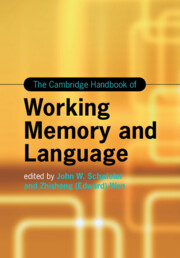Book contents
- The Cambridge Handbook of Working Memory and Language
- Cambridge Handbooks in Language and Linguistics
- The Cambridge Handbook of Working Memory and Language
- Copyright page
- Contents
- Figures
- Tables
- About the Editors
- About the Contributors
- Acknowledgments
- Overview of the Handbook
- Part I Introduction
- Part II Models and Measures
- 3 The Evolution of Working Memory and Language
- 4 The Phonological Loop as a “Language Learning Device”
- 5 The Embedded-Processes Model and Language Use
- 6 Long-Term Working Memory and Language Comprehension
- 7 The Cognitive Neuroscience of Working Memory and Language
- 8 Computational Models of Working Memory for Language
- 9 The Time-Based Resource Sharing Model of Working Memory for Language
- 10 The Ease of Language Understanding Model
- 11 Assessing Children’s Working Memory
- 12 Measuring Individual Differences in Working Memory Capacity and Attention Control and Their Contribution to Language Comprehension
- Part III Linguistic Theories and Frameworks
- Part IV First Language Processing
- Part V Bilingual Acquisition and Processing
- Part VI Language Disorders, Interventions, and Instruction
- Part VII Conclusion
- Index
- References
12 - Measuring Individual Differences in Working Memory Capacity and Attention Control and Their Contribution to Language Comprehension
from Part II - Models and Measures
Published online by Cambridge University Press: 08 July 2022
- The Cambridge Handbook of Working Memory and Language
- Cambridge Handbooks in Language and Linguistics
- The Cambridge Handbook of Working Memory and Language
- Copyright page
- Contents
- Figures
- Tables
- About the Editors
- About the Contributors
- Acknowledgments
- Overview of the Handbook
- Part I Introduction
- Part II Models and Measures
- 3 The Evolution of Working Memory and Language
- 4 The Phonological Loop as a “Language Learning Device”
- 5 The Embedded-Processes Model and Language Use
- 6 Long-Term Working Memory and Language Comprehension
- 7 The Cognitive Neuroscience of Working Memory and Language
- 8 Computational Models of Working Memory for Language
- 9 The Time-Based Resource Sharing Model of Working Memory for Language
- 10 The Ease of Language Understanding Model
- 11 Assessing Children’s Working Memory
- 12 Measuring Individual Differences in Working Memory Capacity and Attention Control and Their Contribution to Language Comprehension
- Part III Linguistic Theories and Frameworks
- Part IV First Language Processing
- Part V Bilingual Acquisition and Processing
- Part VI Language Disorders, Interventions, and Instruction
- Part VII Conclusion
- Index
- References
Summary
In this chapter, we discuss the measurement of working memory capacity and attention control. We begin by examining the origins of complex span measures of working memory capacity, which were created to better understand the cognitive processes underpinning language comprehension. We then review evidence for the executive attention theory of working memory, which places attention control at the center of individual differences in working memory capacity and fluid intelligence. Next, we describe the relationship between working memory capacity, attention control, and language comprehension, and discuss how maintenance and disengagement – two functions supported by the control of attention – contribute to performance across a range of cognitive tasks. We then identify factors that threaten the construct and criterion validity of measures of working memory capacity and attention control and detail the steps our laboratory has taken to refine these measures. We close by providing practical recommendations and resources to researchers who wish to use our new measures of working memory capacity and attention control in their work.
- Type
- Chapter
- Information
- The Cambridge Handbook of Working Memory and Language , pp. 247 - 272Publisher: Cambridge University PressPrint publication year: 2022



